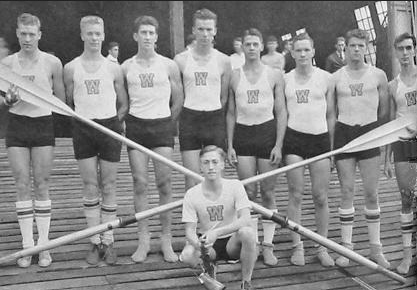The Boys in the Boat, by Daniel James Brown
I’m a sucker for a good athletic success story, no matter what the sport. I’ve devoured and drooled over accounts of Seabiscuit’s exploits, the travails along the Iditarod dog sled race, even cold weather expeditions, like Shackleton in the Antarctic or lost climbers in the high mountains. As long as the hero has an engaging character (and doesn’t everybody?), the odds are long but eventually overcome, and the author recognizes the value of narrative tension, I’m all in.
TBITB checks all the boxes. Brown discovers his story almost by accident. Turns out he lives next door to an extraordinary man, Joe Rantz, who is in his 80s when they met in 2007. Rantz had grown up in the Idaho panhandle, and the Olympic foothills outside of Sequim, Washington. abandoned on the stump farm in his teens when his father and step mother moved to Seattle, he had clawed out a life for himself, which included an ambition to escape the Great Depression via college at the University of Washington. There, he found himself attracted to the upper crust sport of crewing, the art of rowing a boat as fast as possible in a straight line for 2 or more miles.
Along with 8 other young men, he became part of a Freshman Husky crew which won the putative national collegiate championships, and went on to further success the following few years, culminating with a trip to Hitlers Olympics in Berlin, 1936.
Brown recognizes the value of all the characters populating this story. Al Ulbrickson, the former Husky stroke who had himself been a national champion, now coach of the varsity. Ky Ebright, former Husky coxswain, Ulbrickson’s foil as coach at University of California. George Pocock, the Englishman who ends up in the Husky boathouse, hand crafting nearly all the shells used by crews across the country, and who knows more about the art and science of rowing than those two coaches combined. Hitler, his propagandist Goebbels, and film-maker Leni Rifenstahl in Germany, dedicated to showing the world that Deustchland is indeed über alles. And of course, the rowers themselves, who mainly come from the small logging, fishing, and farming communities of Washington state, competing against the eights filled with prep school boys from east coast schools, then men from Germany and Italy and other rowing powerhouses at the Olympics.
Brown is not the most polished writer, but he is thorough in his sources. He draws from contemporaneous records, from local sportswriters, from diaries kept by the crew members and coaches, and recollections from those still alive.
Brown weaves these characters through the distinct era and environment that was the Depression in the Pacific Northwest. Through Joe’s eyes, we get to watch mountains being gouged out for minerals in North Idaho, mountains being logged clean on the Olympic Peninsula, and a mountain being moved aside for the Grand Coulee Dam. We learn about long distance travel by train and ocean liner in those pre-jet aircraft days. But most of all, we learn about the physical and psychological work required to row, often on dark, rainy northern evenings, and never, ever be beaten in any race, culminating with an Olympic Gold medal.

